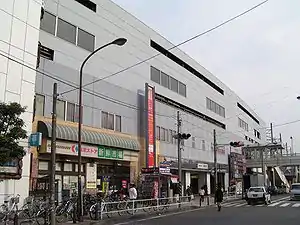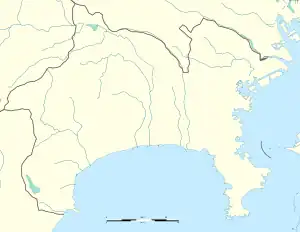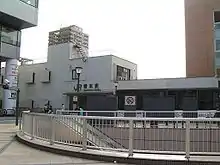JH28 Hashimoto Station 橋本駅 | ||||||||||||||||||||||||||||||||||
|---|---|---|---|---|---|---|---|---|---|---|---|---|---|---|---|---|---|---|---|---|---|---|---|---|---|---|---|---|---|---|---|---|---|---|
 The south side of Hashimoto Station | ||||||||||||||||||||||||||||||||||
| General information | ||||||||||||||||||||||||||||||||||
| Location | 6 Hashimoto, Midori-ku, Sagamihara-shi, Kanagawa-ken 252–0143 Japan | |||||||||||||||||||||||||||||||||
| Coordinates | 35°35′41″N 139°20′40″E / 35.59472°N 139.34444°E | |||||||||||||||||||||||||||||||||
| Operated by | ||||||||||||||||||||||||||||||||||
| Line(s) | ||||||||||||||||||||||||||||||||||
| Platforms | 1 side platform + 3 island platforms | |||||||||||||||||||||||||||||||||
| Connections | Bus stop | |||||||||||||||||||||||||||||||||
| Other information | ||||||||||||||||||||||||||||||||||
| Status | Staffed (Midori no Madoguchi) | |||||||||||||||||||||||||||||||||
| Station code | KO45 (Keio) JH28(Yokohama line) | |||||||||||||||||||||||||||||||||
| History | ||||||||||||||||||||||||||||||||||
| Opened | 23 September 1908 | |||||||||||||||||||||||||||||||||
| Passengers | ||||||||||||||||||||||||||||||||||
| FY2019 | 65,328 (JR, boarding); 98,086 (Keio, total) | |||||||||||||||||||||||||||||||||
| Services | ||||||||||||||||||||||||||||||||||
| ||||||||||||||||||||||||||||||||||
| Location | ||||||||||||||||||||||||||||||||||
 Hashimoto Station Location within Kanagawa Prefecture  Hashimoto Station Hashimoto Station (Japan) | ||||||||||||||||||||||||||||||||||
Hashimoto Station (橋本駅, Hashimoto-eki) is a major passenger interchange railway station located in the city of Sagamihara, Kanagawa, Japan and operated by the East Japan Railway Company (JR East) and the private railway operator Keio Corporation.
Lines
Hashimoto Station is served by the Yokohama Line and Sagami Line operated by JR East, as well as the Keio Sagamihara Line. It is 33.8 km (21.0 mi) from Higashi-Kanagawa, 33.3 km (20.7 mi) from Chigasaki, and 38.1 km (23.7 mi) from Shinjuku, the termini of these three lines respectively.
Station layout


The JR East station has two island platforms and one side platform. The station building is built above the platforms and tracks, and the station has a "Midori no Madoguchi" staffed ticket office.[1] The Keio station has one elevated island platform, with the station building underneath. Interconnecting from platform 5 is impossible (as of 2022). There are platform screen doors on platforms 1, 2, and 3 for the Yokohama Line. Beyond platform 4, the tracks of the Sagami Line connect with the Yokohama Line (towards Hachiōji Station). Until March 2022, the Sagami Line provided through service onto the Yokohama Line.
JR East platforms
| 1-2 | JH Yokohama Line | for Machida, Higashi-Kanagawa, Yokohama, Sakuragichō and Ofuna |
| 3 | JH Yokohama Line | for Hachiōji |
| 4-5 | ■ Sagami Line | for Ebina and Chigasaki |
Keio platforms
| 1 | KO Keiō Sagamihara Line | for Keiō-Tama-Center, Chōfu, Meidaimae, and Shinjuku |
| 2 | KO Keiō Sagamihara Line | for Keiō-Tama-center, Chōfu, Meidaimae, and Shinjuku |
History
The JR East station opened on 23 September 1908.[2] The Keio station opened on 31 March 1990.[3]
Station numbering was introduced to the Yokohama Line on 20 August 2016 with Hashimoto being assigned station number JH28.[4][5]
Future plans
The Kanagawa Prefectural Government has expressed its wishes to build an interchange station here on the Chuo Shinkansen high-speed maglev line, which is scheduled to open in 2027.[2]
Passenger statistics
In fiscal 2019, the JR station was used by an average of 65,328 passengers daily (boarding passengers only).[6] During the same period, the Keio portion of the station was used by 98,086 passengers daily (total).[7]
The passenger figures for previous years are as shown below.
| Fiscal year | daily average (JR) | daily average (Keio) | |
|---|---|---|---|
| 2005 | 54,854 | 54,854 | [8] |
| 2010 | 60,122 | 43,621 | [9] |
| 2015 | 64,473 | 46,530 | [10] |
Surrounding area
- Midori Ward Office
See also
References
- ↑ 各駅情報(橋本駅) [Station Information: Hashimoto Station] (in Japanese). Japan: East Japan Railway Company. Retrieved 21 August 2012.
- 1 2 週刊JR全駅・全車両基地 No.03 [Weekly All Stations and All Depots No.3]. Japan: Asahi Shimbun Publications Inc. August 2012. p. 27. EAN 4910232440825.
- ↑ Terada, Hirokazu (19 January 2013). データブック日本の私鉄 [Databook: Japan's Private Railways]. Japan: Neko Publishing. p. 229. ISBN 978-4-7770-1336-4.
- ↑ "⾸都圏エリアへ 「駅ナンバリング」を導⼊します" [Introduce “station numbering” to the Tokyo metropolitan area] (PDF). jreast.co.jp (in Japanese). 6 April 2016. Archived from the original (PDF) on 7 December 2022. Retrieved 7 January 2023.
- ↑ Kusamachi, Yoshikazu (7 April 2016). "JA・JK・JT・AKB…JR東日本、首都圏で駅ナンバリングなど導入へ" [JA, JK, JT, AKB … JR East to introduce station numbering in the Tokyo metropolitan area]. Response Automotive Media (in Japanese). Archived from the original on 6 August 2022. Retrieved 7 January 2023.
- ↑ 各駅の乗車人員 (2019年度) [Station passenger figures (Fiscal 2019)] (in Japanese). Japan: East Japan Railway Company. 2020. Retrieved 11 August 2020.
- ↑ 鉄道事業概要 (2019年度) [Station passenger figures (Fiscal 2019)] (in Japanese). Japan: Keio Railway Company. 2020. Retrieved 11 August 2020.
- ↑ 神奈川県県勢要覧(平成18年度) [Kanagawa Prefecture official statistics (fiscal 2005)] (PDF) (in Japanese). Japan: Kanagawa Metropolitan Government. Retrieved 26 March 2021.
- ↑ 神奈川県県勢要覧(平成23年度) [Kanagawa Prefecture official statistics (fiscal 2010)] (PDF) (in Japanese). Japan: Kanagawa Prefecture. Retrieved 26 March 2021.
- ↑ 神奈川県県勢要覧(平成28年度 [Kanagawa Prefecture official statistics (fiscal 2010)] (PDF) (in Japanese). Japan: Kanagawa Prefecture. Retrieved 26 March 2021.
External links
![]() Media related to Hashimoto Station (Kanagawa) at Wikimedia Commons
Media related to Hashimoto Station (Kanagawa) at Wikimedia Commons
- JR East station information (in Japanese)
- Keio station information (in Japanese)